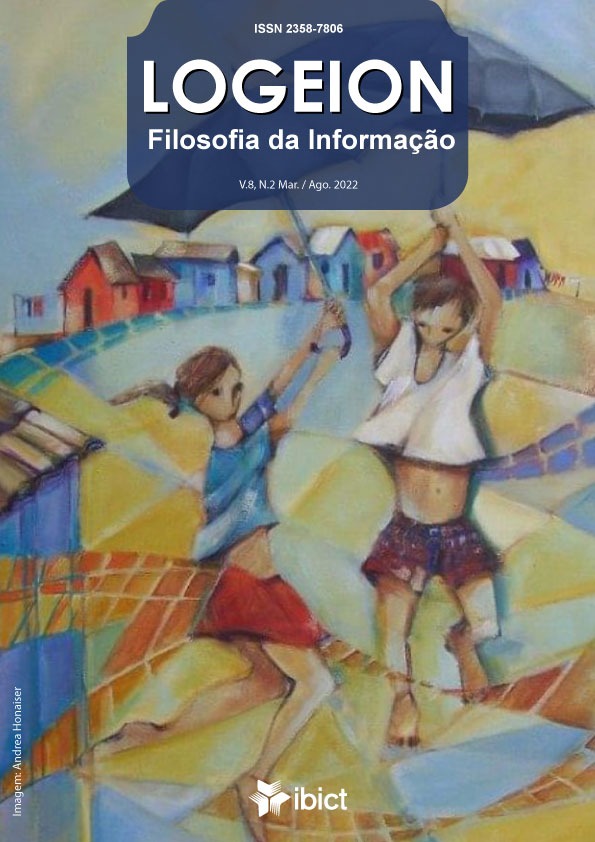Disciplinary society and society of control
an analysis based on a redefinition of a Brazilian public library
DOI:
https://doi.org/10.21728/logeion.2022v8n2.p82-99Keywords:
Public Library, Disciplinary Society, Society of control, Innovation, EpistemologyAbstract
From the 18th century onwards, the imposition of control of the main social and political policies on the population began to occur primarily through urban strategies. Architecture reveals the objective of disciplining bodies in order to prepare them for insertion in the incipient capitalist society, whether in the form of schools, factories or prisons. At first, we aimed to reflect, through the historical and architectural trajectory of the Municipal Public Library of Marília, if the old library has the preponderance of a disciplinary institution; to, in a second moment, present an architecture in the new building, verifying whether the new library model can show a transition from the disciplinary to the control model. Methodologically, this is a qualitative, documentary and bibliographic research, in which we use the Bardin Content Analysis method to analyze interview categories. For that, it uses some of the thought of Foucault and Deleuze about the theme, as well as the history, architecture and a little of the organization of the collections of the library in question in different spaces and times. We conclude that the new library is no better than the old one. It just fits better to the dictates of the new times, with new social and technological possibilities. The ancient library played a very important role in the history of the city and its users. It was just no longer appropriate for the 21st century, needing a new look and feel
Downloads
References
ADORNO, T. W. Minima Moralia: reflexões a partir da vida danificada. 2. ed. São Paulo: Ática, 1993.
BIBLIOTECA PÚBLICA (2017). Disponível em:
https://www.marilia.sp.gov.br/portal/turismo/0/9/5630/biblioteca-municipal. Acesso em: 08 mar 2021.
BIBILIOTECA VIVA/PREFETURA DE SÃO PAULO (2021). Disponível em: https://www.prefeitura.sp.gov.br/cidade/secretarias/cultura/bibliotecas/Acesso em: 08 set. 2021.
BARDIN, L. Análise de conteúdo. São Paulo: Edições 70, 2009.
COSTA, R. Sociedade se controle. São Paulo em Perspectiva. São Paulo, vol. 18, p. 161-167, 2004. Disponível em:
https://www.scielo.br/j/spp/a/ZrkVhBTNkzkJr9jVw6TygVC/?format=pdf&lang=pt. Acessoem:12 jul.2021.
CAPRIOLI, M. S.; LIMA, L. M.; MARTÍNEZ-ÁVILA, D.; MORAES, J. B. E. Foucault: poder, vigilância, disciplina e punição uma análise do conceito de panóptico em obra narrativa de ficção. Informação & Informação, v. 22, n. 3, p. 297-319, 2017. Disponível em:https://brapci.inf.br/index.php/res/v/34861. Acesso em: 29 jul. 2021.
DELEUZE, G. A sociedade de controle: manipulação e modulação nas redes digitais. São Paulo: Hedra, 2019.
DELEUZE, G. Pourparlers. Paris: Les Éditions de Minuit,1990.
MARTINS, Wilson. A palavra escrita: história do livro, da imprensa e da biblioteca. 3ed. São Paulo: Ática, 2002.
FAGOTI, R. Marília ganhará biblioteca modelo no Estado de São Paulo, 2017. Disponível em: https://www.marilia.sp.gov.br/portal/noticias/0/3/2510/marilia-ganhara-biblioteca-modelo-no-estado-de-sao-paulo. Acesso em: 21 jul. 2021.
FOUCAULT, M. Microfísica do poder. São Paulo: Graal, 2006.
FOUCAULT, M. Vigiar e Punir. Petrópolis: Vozes, 1998.
MELLO, M. R. G.; ÁVILA, D. M.; ARAUJO, L. M.; VALENTIM, M. L. P. Entre técnica e reflexão: um estudo da função social das bibliotecas públicas a partir da teoria crítica. Informação & Informação, v. 25, n. 4, p. 377-401, 2020. https://brapci.inf.br/index.php/res/v/152228. Acesso em: 13 jul. 2021.
TEIXEIRA, W.A.M.; SILVA, M.A. Levantamento histórico pontos turísticos roteiro histórico: arquitetônico. Marília: Comissão de Cultura e História, 2000.
TEIXEIRA,W.A.M. Ações de conservação e preservação da memória no contexto digital. Transinformação. Campinas: PUC, v.14, n.2, p.179-180, 2002. Disponível em:
http://periodicos.puccampinas.edu.br/seer/index.php/transinfo/article/view/1500/1474. Acesso em: 12 fev. 2021.
Downloads
Published
Issue
Section
License
Copyright (c) 2023 Logeion: Filosofia da Informação

This work is licensed under a Creative Commons Attribution-NonCommercial-ShareAlike 4.0 International License.
The journal is published under the Creative Commons - Attribution - Noncommercial - Share Alike 3.0 Brazil.
The published work is considered collaboration and therefore the author will not receive any remuneration for this as well as anything will be charged in exchange for publication.
All texts are responsibility of the authors.
It’s allowed partial or total reproduction of the texts of the magazine since the source is cited.




